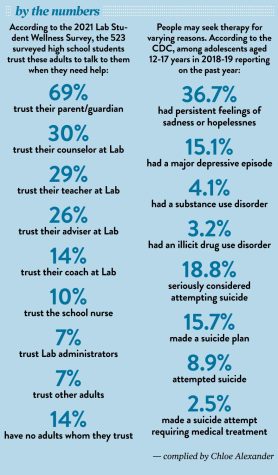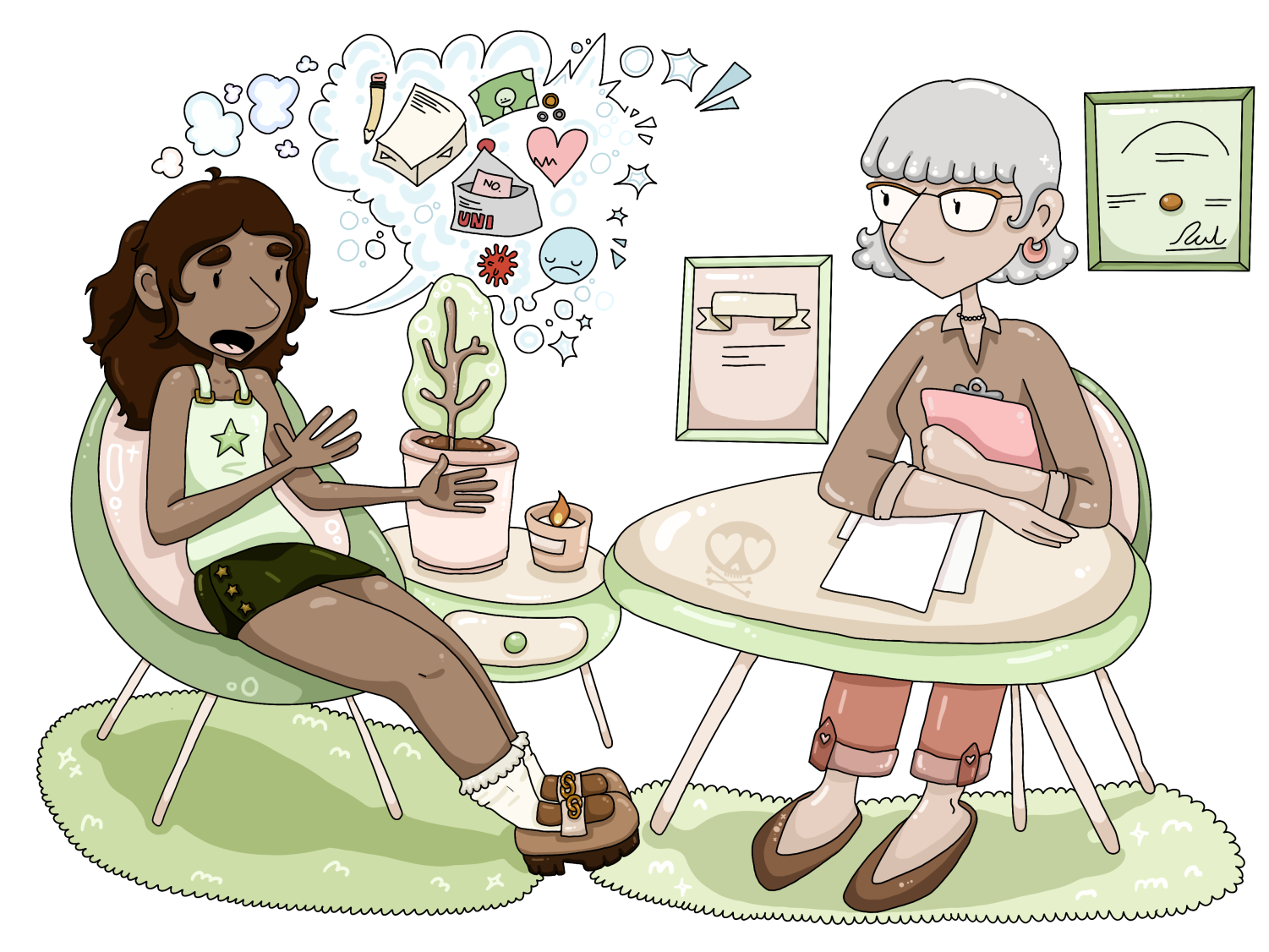Rethinking Therapy: The harder parts of improving mental health
September 29, 2022
Barriers restrict therapy access
Norie Kaufman-Sites says she’s lucky. When Norie, a junior, decided to start therapy a little over two years ago, she was able to find a therapist who felt like a good fit through a family friend’s recommendation. Norie didn’t have to wait for an opening or hassle her parents for insurance information.
Norie knows her experience is far from the norm. She’s seen friends spend upward of six months wading through waitlists before finally receiving help, and others struggle with a rotating cast of new providers. Norie’s friends represent a larger trend: right now, it’s hard for teens to get the help they need.
The demand for mental health services has been outpacing available practitioners for years, but the pandemic exacerbated the issue. A 2021 study from the American Psychological Association showed that only 35% of psychologists had the capacity to accept new clients and 68% of psychologists’ waitlists had grown longer since 2020.
The pandemic’s impact on demand for mental health services is especially visible in adolescents. Data from the Centers for Disease Control and Prevention shows that 44% of students reported they persistently felt sad or hopeless in 2022, compared to 37% in 2019.
Michael Bruner, a U-High counselor who also maintains a private practice, has seen this statistical demand increase in real time. Currently, Mr. Bruner has no openings for new clients; his entire schedule is filled.
“I think when the pandemic was underway, a lot of people were feeling enormous amounts of stress, and anxiety, and depression and other mental health issues,” Mr. Bruner said. “That’s when we saw a really big uptick in requests for therapy. Many, many, many practices filled up. So, there has been a shortage. We’ve started seeing people spending a lot of time on waitlists.”
Ilayna Mehrtens, a pediatric psychologist at the University of Chicago, shares Mr. Bruner’s sentiment, having witnessed both sides of the congested therapy system.
“There are a lot of people who are seeking out services who aren’t able to receive them.” Dr. Mehrtens said. “It’s been hard. It’s been hard for my own colleagues to find services for themselves.”
Teenagers can face additional hurdles when seeking mental health support. Minors rely on their guardians’ insurance and permission to participate in therapy. Additionally, finding a therapist and setting appointments can be difficult without deeper involvement from an adult.
“If your parents aren’t super committed and really diligent about getting you to therapy, it can be, like, almost impossible to try and find someone,” Norie said. “Your parents are going to have to reach out to a lot of people and put in a lot of time.”
School and homework complicate scheduling for students, making the regular time commitment required for therapy sometimes unfeasible. Kai Gregorski, a ninth grader who stopped going to therapy five months ago, said weekly appointments worked well with their schedule previously, but now, as a ninth grader, weekday appointments would take too much time from homework, and weekend appointments are rarely open.
Even as teenagers face increased challenges to access therapy, they can be in particular need of this support as they move between childhood and adulthood, according to Dr. Mehrtens. Increased responsibilities and pressure, paired with rapid physiological development, often result in teenagers needing outside support to help manage their changing lives and emotions.
“Adolescents, by definition, are in this stage of life where they are going from being kids to adults, and that transition is quite difficult,” Dr. Bruner said.
Despite the difficult system, Norie encourages her peers to seek therapy to address both large issues and more subtle problems. Mr. Bruner and Dr. Mehrtens also both expressed hope that teenagers can find support even when the process is discouraging.
“In most settings, the folks teenagers interact with have judgments,” Dr. Mehrtens said. “Therapy is one of the few places where one can get support as an adolescent without being judged.”
Therapy doesn’t always work
Sinking into a comfortable chair, facing a pad and paper, junior Kian Quinn-Calabrese prepares himself to share another personal story. But he’s not in a writing class or conversing with some friends, he’s speaking to his waiting therapist.
In 2017, Kian entered adolescent therapy hoping to work on anger management and to receive advice for his declining mental health. While Kian’s experience was not satisfactory, he recognizes the impact that therapy can have on adolescents’ mental health and well being.
“My parents weren’t exactly happy with me being more aggressive with my brother and having some anger issues,” he said. “So I began, and they took me to therapy to, you know, correct those.”
But Kian’s initial sessions with his therapist were not as productive as he hoped, and he felt a disconnect in the whole experience.
“The first time I had met them wasn’t really a good experience. They just seem to be judging me the entire time,” Kian said. “I wasn’t really happy with it.”
Over time, Kian grew to appreciate the therapist’s listening techniques, but he wished they would do more to provide tangible solutions to his issues.
“They never gave me anything to help me. It was more of just a place for me to vent, and they wouldn’t say anything,” Kian said. “They would ask for a lot of details, but they would never tell me what to do in the situations.”
When the sessions moved online during COVID-19, both parties mutually agreed to part ways, coming to the conclusion that Kian didn’t have enough to talk about at the time.
In retrospect, Kian believes therapy didn’t have the positive impact on his mental health that he hoped for.
“Just overall, the therapy didn’t really change my mental health. My mental health was declining, but it didn’t really change or help me get better in any way,” he said.
Nevertheless, Kian recognizes the benefit of therapy sessions on certain individuals who are struggling with personal issues. Even though it didn’t work well for him, each experience with therapy is unique.
Kian said, “If you feel that stuff is not going right in your life, and you just need someone to talk to, yeah, therapy might be something for you.”
Mental health by the numbers

